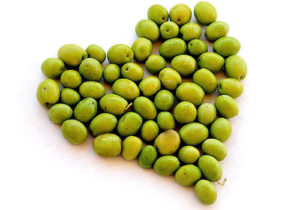 Many studies and research have shown that daily consumption of extra virgin olive oil in human nutrition helps to improve a person’s health and well-being thanks to the pharmacological properties of some substances in the oil, such as the polyphenols. Extra virgin olive oil is rich in anti-inflammatory factors, antioxidants such as tocopherols, phenolic compounds, carotenoids and squalene. It also contains beta-carotene, vitamins (A, D, E, K) and microelements such as calcium, iron, zinc and magnesium, all of which are necessary for our bodies.
Many studies and research have shown that daily consumption of extra virgin olive oil in human nutrition helps to improve a person’s health and well-being thanks to the pharmacological properties of some substances in the oil, such as the polyphenols. Extra virgin olive oil is rich in anti-inflammatory factors, antioxidants such as tocopherols, phenolic compounds, carotenoids and squalene. It also contains beta-carotene, vitamins (A, D, E, K) and microelements such as calcium, iron, zinc and magnesium, all of which are necessary for our bodies.
There are numerous organs that, directly or indirectly, benefit from the biologically active substances present in extra virgin olive oil: these include the colon, liver and kidneys, essential organs involved in the treatment of exogenous substances and in the elimination of impurities. Acting in synergy with the body’s natural resources, the substances contained in extra virgin olive oil help to preserve well-being and health, providing a precious protection against inflammatory processes and against some forms of cancer.
Antioxidant and anti-aging effect: extra virgin olive oil, unlike other types of oil, has a high content of phenolic compounds, or polyphenols which, being antioxidants, reduce the action of free radicals on our DNA and protect the body against inflammatory processes and against cellular aging. Thus, they are useful in the prevention of many diseases such as diabetes and cancer.
Positive effects on cholesterol: extra virgin olive oil contains mainly unsaturated fats and is therefore recommended as a dressing for many foods instead of butter which, on the contrary, is rich in cholesterol. Extra virgin olive oil, due to its particular composition and unsaturated fatty acids, is just one of the most suitable dressings for persons who suffer from high cholesterol. In fact, it helps to control the levels of LDL cholesterol (the bad one), without adversely affecting the amount of HDL cholesterol (the good one).
High vitamin content: olive oil is rich in fat-soluble vitamins such as A, D, E, K. Vitamin K is necessary as a coenzyme as it activates different factors involved in blood coagulation and in the formation of the bone matrix, together with vitamin D. Vitamin E is an antioxidant and a micronutrient that helps to preserve the health of bones, protecting them from osteoporosis and decalcification. Vitamin E promotes the use of Vitamin A, which is not directly present but is formed by resolution of b-carotene by an enzyme present in the liver; for this reason, the b-carotene is defined provitamin A.
Cardiovascular dieses: extra virgin olive oil also seems to have a protective effect against cardiovascular diseases, such us atherosclerosis, the leading cause of heart attack, strokes and heart problems. Studies and research have shown that regular consumption of extra virgin olive oil in human nutrition helps to prevent many cardiovascular diseases and reduces (by more than 60%) the risk of heart attack. Helping to normalise glycaemia and to reduce the levels of so-called “bad” cholesterol (LDL), extra virgin olive oil is confirmed, in fact, the anti-atherosclerotic ingredient par excellence. The polyphenols and antioxidants present in extra virgin olive oil are beneficial for people who suffer from high blood pressure or dyslipidaemias, both of which contribute to increasing cardiovascular risk. The hydrophilic polyphenols present in olive oil have anti-hypertensive activity, help to regulate the blood pressure, platelet and endothelial.
Intestinal regularity: olive oil has a gastroprotective effect and the substances contained in it contribute to regulate bowel movement and facilitate the hepatic activity.
Excellent during children’s growth: extra virgin olive oil is an essential food for children because, by stimulating the intestinal absorption of calcium, it promotes bone development, the growth of long bones and the process of myelination of the brain; it is also a great help to the immune system. In adulthood, however, it protects us from diseases linked to the slowdown and the deterioration of brain functions, such as Parkinson’s and Alzheimer’s.
An ally for the health of skin and hair: extra virgin olive oil has a high fat content and thus it is an emollient skin product with high nutritional properties. These properties can be used to prevent skin dryness and to nourish the dermis of the scalp, making hair soft and shiny. Moreover, thanks to its antioxidants, extra virgin olive oil prevents skin inflammation and cell aging, thus keeping the skin younger.
It has one of the highest smoke points of all oils (suitable for frying: One of the criterion for assessing olive oil as particularly suitable for cooking and frying is its smoke point, i.e. the critical temperature at which the oil starts to burn, produce smoke and release harmful and toxic substances. Extra virgin olive oil has excellent resistance to high temperatures because its smoke point is 210 degrees centigrade. When you consider that the temperatures during frying are usually around 160-170°C, we can say that extra virgin olive oil is particularly suitable. Furthermore, what makes extra virgin olive oil particularly suitable for the various types of cooking, in addition to its high smoke point, is also the presence of polyphenols and vitamin E which protect us against degradation phenomena.

